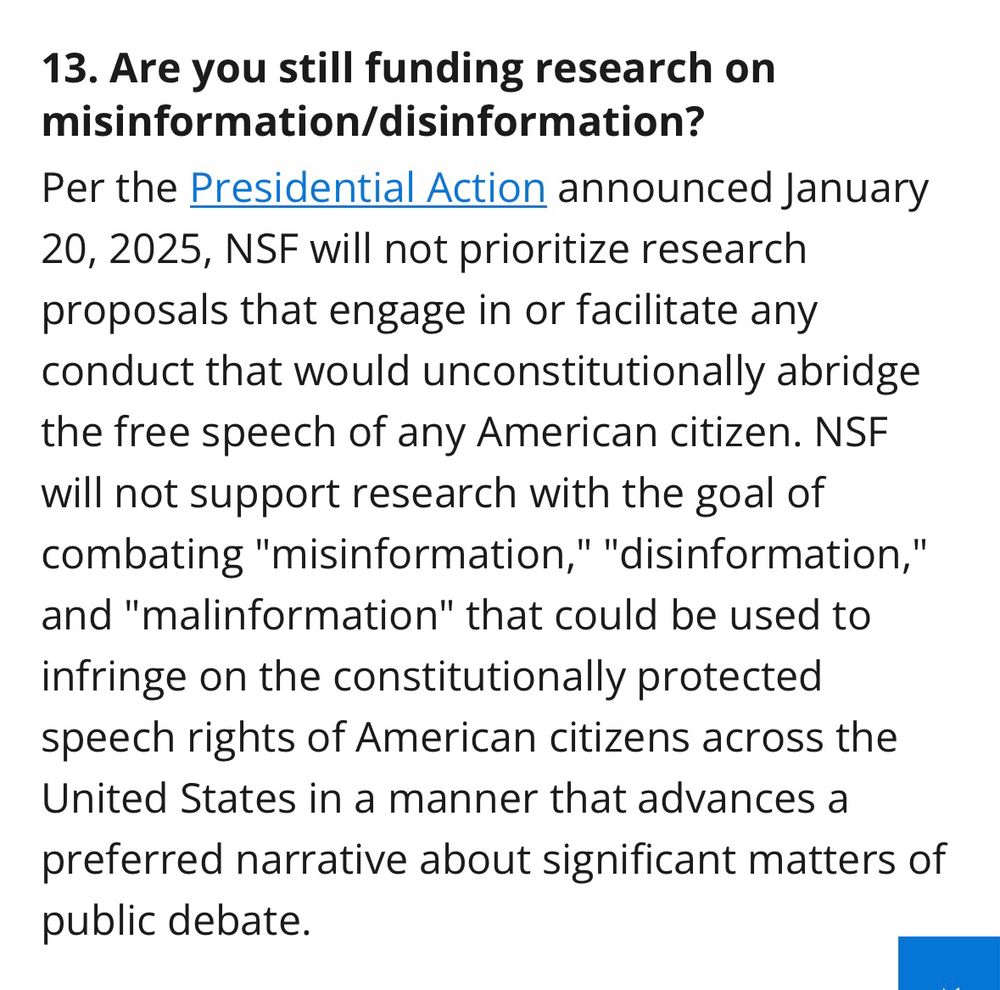
A new paper by George Borjas—who served this past year in the Trump White House designing some of its anti-immigration policies—claims to display evidence of ideological bias among researchers who study immigration.
doi.org/10.1126/scia...
🧵 Thread—>
06.01.2026 19:59 — 👍 259 🔁 98 💬 4 📌 29
ScienceDirect.com | Science, health and medical journals, full text articles and books.
Are leaders blamed for disasters that eventually did not occur? The answer points to the crucial impact of partisanship in assigning blame for events that almost happened. @jexpsocpsych.bsky.social w/ Matejas Mackin, @danieleffron.bsky.social, and Neal Roese
authors.elsevier.com/sd/article/S...
26.12.2025 12:27 — 👍 5 🔁 2 💬 0 📌 0

screenshot of my post
Big new blogpost!
My guide to data visualization, which includes a very long table of contents, tons of charts, and more.
--> Why data visualization matters and how to make charts more effective, clear, transparent, and sometimes, beautiful.
www.scientificdiscovery.dev/p/salonis-gu...
09.12.2025 20:28 — 👍 801 🔁 318 💬 22 📌 50
Edit: The 2nd point in post 5 should read "Is positively (vs. not significantly) associated with reading times for conspiracy (vs. non-conspiracy) articles"
01.12.2025 16:02 — 👍 0 🔁 0 💬 0 📌 0
ScienceDirect.com | Science, health and medical journals, full text articles and books.
More research is certainly needed before using counterfactual thinking to tackle conspiracy theories in the field, but our paper provides a promising first step.
Again, if you want to know more, read the paper here: authors.elsevier.com/sd/article/S...
n/n
27.11.2025 09:40 — 👍 2 🔁 1 💬 0 📌 0
We also find that high conspiracy mentality:
- Makes people click on fewer non-conspiracy headlines (but not more conspiracy headlines)
- Reduces reading times for conspiracy articles (but not non-conspiracy articles)
- Does not change the effects of counterfactual thinking manipulations
5/n
27.11.2025 09:40 — 👍 2 🔁 0 💬 2 📌 0
3) Reading counterfactuals reduces engagement with conspiracy theories:
- It reverses people's default preference for conspiracy over non-conspiracy articles (in terms of clicks and reading times)
- It makes people spend less time reading conspiracy (but not non-conspiracy) articles
4/n
27.11.2025 09:40 — 👍 1 🔁 0 💬 1 📌 0
Key findings:
1) Encouraging counterfactual thinking about conspiracy beliefs (e.g., "If only I had not fallen down the rabbit hole ...") makes people consider opposing viewpoints and reflect on their views on conspiracy theories.
2) Reading counterfactuals does not reduce conspiracy beliefs.
3/n
27.11.2025 09:40 — 👍 1 🔁 0 💬 1 📌 0
ScienceDirect.com | Science, health and medical journals, full text articles and books.
If you are interested in conspiracy beliefs (and how to fight them), counterfactual thinking, or selective exposure (i.e., people's preference for information confirming their views), read the paper here:
authors.elsevier.com/sd/article/S...
Below is a summary of the most important findings.
2/n
27.11.2025 09:40 — 👍 1 🔁 0 💬 1 📌 0

Screenshot of the abstract for the article "If only I had not fallen down the rabbit hole: Counterfactual thinking reduces engagement with conspiracy theories" in the Journal of Experimental Social Psychology.
New paper out in @jexpsocpsych.bsky.social !
We (@kwinter.bsky.social, @kaiepstude.bsky.social , Bob Fennis and I) found that encouraging counterfactual thinking reduces engagement with conspiracy theories (i.e., clicks on, and reading times for, conspiracy articles).
A 🧵
1/n
27.11.2025 09:40 — 👍 36 🔁 15 💬 1 📌 4
ScienceDirect.com | Science, health and medical journals, full text articles and books.
More research is certainly needed before using counterfactual thinking to tackle conspiracy theories in the field, but our paper provides a promising first step.
Again, read the paper here if you want to know more: authors.elsevier.com/sd/article/S...
n/n
27.11.2025 09:33 — 👍 0 🔁 0 💬 0 📌 0
We also find that high conspiracy mentality:
- Makes people click on fewer non-conspiracy headlines (but not more conspiracy headlines)
- Reduces reading times for conspiracy articles (but not non-conspiracy articles)
- Does not shape the effects of counterfactual thinking manipulations
5/n
27.11.2025 09:33 — 👍 0 🔁 0 💬 1 📌 0
3) Reading counterfactuals reduces engagement with conspiracy theories:
- It reverses people's default preference for conspiracy over non-conspiracy articles (in terms of clicks and reading times)
- It makes people spend less time reading conspiracy (but not non-conspiracy) articles
4/n
27.11.2025 09:33 — 👍 0 🔁 0 💬 1 📌 0
Key findings:
1) Encouraging counterfactual thinking about conspiracy beliefs (e.g., "If only I had not fallen down the rabbit hole ...") makes people consider opposing viewpoints and reflect on their views on conspiracy theories.
2) Reading counterfactuals does not reduce conspiracy beliefs.
3/n
27.11.2025 09:33 — 👍 0 🔁 0 💬 1 📌 0
ScienceDirect.com | Science, health and medical journals, full text articles and books.
If you are interested in conspiracy beliefs (and how to fight them), counterfactual thinking, or selective exposure (i.e., people's preference for information confirming their views), read the paper here:
authors.elsevier.com/sd/article/S...
Below is a summary of the most important findings.
2/n
27.11.2025 09:33 — 👍 0 🔁 0 💬 1 📌 0
While more research is needed before using counterfactual thinking in the field, our findings offer a promising first step toward reducing conspiracy engagement.
n/n
27.11.2025 09:17 — 👍 0 🔁 0 💬 0 📌 0
We also find that being drawn to conspiracy theories (i.e., high conspiracy mentality) makes people click on fewer non-conspiracy headlines (but not more conspiracy headlines) and spend more time reading conspiracy articles (but not less time reading non-conspiracy articles).
5/n
27.11.2025 09:17 — 👍 0 🔁 0 💬 1 📌 0
3) Reading counterfactuals reduces engagement with conspiracy theories:
- It reverses people's default preference for conspiracy over non-conspiracy articles (in terms of clicks and reading times)
- It makes people spend less time reading conspiracy (but not non-conspiracy) articles
4/n
27.11.2025 09:17 — 👍 0 🔁 0 💬 1 📌 0
Key findings:
1) Encouraging counterfactual thinking about conspiracy beliefs (e.g., "If only I had not fallen down the rabbit hole ...") makes people consider opposing viewpoints and reflect on their views on conspiracy theories.
2) Reading counterfactuals does not reduce conspiracy beliefs.
3/n
27.11.2025 09:17 — 👍 0 🔁 0 💬 1 📌 0
ScienceDirect.com | Science, health and medical journals, full text articles and books.
If you are interested in conspiracy beliefs (and how to fight them), counterfactual thinking, or selective exposure (i.e., people's preference for information confirming their views), read the paper here:
authors.elsevier.com/sd/article/S...
Below is a summary of the most important findings.
2/n
27.11.2025 09:17 — 👍 0 🔁 0 💬 1 📌 0
At ZPID we are searching for a tenure track assistant professor for Psychological Metascience in joint appointment with @unitrier.bsky.social preferably someone who has conducted quantitative research in metascience in psychology or related disciplines. Questions? Feel free to contact me personally.
26.11.2025 10:37 — 👍 17 🔁 18 💬 0 📌 2

Three schematic diagrams. The first illustrates selective publishing of internal resection, the second selective causal focus, and the third selective access and funding for researchers.
1. We ( @jbakcoleman.bsky.social, @cailinmeister.bsky.social, @jevinwest.bsky.social, and I) have a new preprint up on the arXiv.
There we explore how social media companies and other online information technology firms are able to manipulate scientific research about the effects of their products.
24.10.2025 00:47 — 👍 759 🔁 356 💬 16 📌 21
The deadline for the meeting on counterfactuals is coming up. Don't forget to send in your contribution.
21.10.2025 06:32 — 👍 2 🔁 6 💬 0 📌 0

Is There a Better Way to Fight Misinformation?
What if the best way to counter misinformation isn’t arguing facts, but offering better truths instead?
“Bypassing” is a promising strategy for countering misinformation by sharing truthful, positively framed statements instead of direct corrections. New research shows it can correct misperceptions effectively, especially when people are still open to learning.
www.psychologytoday.com/us/blog/misg...
22.04.2025 14:38 — 👍 118 🔁 46 💬 9 📌 8
I got an email yesterday afternoon that my NSF SPRF Postdoctoral Fellowship was terminated. My grant focused on testing interventions to address online misinformation and I was 8 months into a two year appointment.
19.04.2025 16:43 — 👍 1047 🔁 463 💬 70 📌 24

This statement from the NSF is insane.
Science is, in essence, designed to separate the true from the false.
Understanding how falsehoods spread is key to the scientific endeavor. It is not a violation of free speech to be proven wrong.
18.04.2025 20:51 — 👍 2640 🔁 999 💬 98 📌 109
Congratulations! Sounds like a highly interesting paper!
18.03.2025 07:08 — 👍 1 🔁 0 💬 1 📌 0
A nonprofit organization that synthesizes and integrates knowledge for the progress of science and the benefit of society.
https://www.annualreviews.org
I’m a social-psychology trained professor of organizational behavior at London Business School. I study behavioral ethics, moral psychology, and why people condone misinformation.
danieleffron.com
International nonprofit protecting human rights online by tackling the spread of online harms. US 501(c)(3) non-profit. Media: media@counterhate.com
An open access, open science psychology journal from @ucpress.bsky.social, and the official journal of @improvingpsych.org (SIPS). Editor-in-Chief: @donvanraven.bsky.social
https://online.ucpress.edu/collabra
Co-founder & editor, Works in Progress. Writer, Scientific Discovery. Podcaster, Hard Drugs. Advisor, Coefficient Giving. // Previously at Our World in Data.
Newsletter: https://scientificdiscovery.dev
Podcast: https://harddrugs.worksinprogress.co
🏳️🌈
Social psychology; political psychology; Uni Cologne
🌐Studies influence, propaganda, platform design@Georgetown
✍🏼Lawfare,The Atlantic
📕Invisible Rulers: The People Who Turn Lies Into Reality (invisiblerulers.com) —how influencers, algorithms, &online crowds shape public opinion
🦹🏻♀️Twitter Files supervillain
Public sphericist.
Ability to rage correctly.
He/him
Conspiracy beliefs, apocalypticism, extremism, new religious movements. Skeptical Norwegian. Professor, Religionswissenschaft.
Lecturer in Psychology of Communication and New Media, University of Würzburg. Interested in #DigitalMedia, #Misinformation, #MotivatedReasoning, #AutobiographicalMemory, #MetaScience & More. Desperately trying to learn Hungarian.
Senior Lecturer/ Teaching Fellow, University of East London. Aged psychologist, with interests in teaching ‘thinking’ skills and mis/disinformation. ‘Woke-poison peddler’
Social psychologist | Postdoc Researcher in Political Communication at the DCU Institute for Future Media, Democracy and Society (FuJo) | Public deliberation, Misinformation, Climate Change, Intergroup attitudes, Politics, Prejudice | He/him
Views my own
Director of Education for MediaSmarts, Canada's centre for digital media literacy. He/him. Open to correction.
Gender Scholar
Interests: (a)sexualities, health communication, masculinities, contraception/safer sex, repro health, climate crisis, IR, peace/conflict studies, utopias/dystopias, mental health, media, history,...
https://orcid.org/0009-0009-7802-2721
Open archive of social science. Free. Academy owned. Posts by director Philip N. Cohen. Say it: so-SHAR-kive (soʊʃɑrkaɪv). Website: socarxiv.org. New papers post at: https://bsky.app/profile/socarxivbot.bsky.social
Prof of #EnvironmentalPsychology @univienna.ac.at
@envpsyvienna.bsky.social
https://ech.univie.ac.at
#BehaviouralSciences #RiskPerception #SocialCognition #PlasticPollution #Microplastics #PFAS #Nature etc...
Sentientism, food policy for desired/anticipated consumption patterns, plant-based food for climate, consumption behaviour, history and reporting of global goals, framing.
Cognition, neuroscience, belief, fiction.
Author: Total bullshit (2018), Le Complotisme: cognition, culture, société (2021), Croiver (2022), L’Expertise sans peine (2023), La Force de nos bugs (2023)
https://sites.google.com/view/sebastian-dieguez/home
Professor and Chair of the Social-Personality Psychology Program at Queen’s University, Canada.
Sustainable Consumption | Environmental Psychology
PhD Researcher, Consumer Psychology & Marketing, University of Amsterdam | MSc. Social Psychology, VU Amsterdam '21 | BA Psychology, Koc University '19
https://www.linkedin.com/in/sezin-ekinci/







